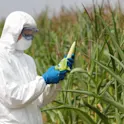Sustainability
12 Sep 2016
Don’t fear GM crops, they could help solve the sustainability crisis
by Emily Barker, Frontiersin.org Modified crops are nothing to be scared of and could be essential in solving the global sustainability crisis, explained Dr. James Lloyd, Deputy Field Chief Editor for Plant Biotechnology in the open-access journal Frontiers in Planet Science. Much of southern Africa is currently suffering consecutive seasons of drought, and farmers in Eastern Kenya have lost more than 80% of their crops due to lack of rain. These droughts, caused by climate change, could potentially leave 36m people across Africa facing hunger. However, there is hope in drought resistant crops. Over a five-year period, a total of 2.9 million farmers in 13 African countries saw their yields increase by 20% to 30% after sowing a variety of drought-tolerant hybrids. “I think that using this type of technology has huge potential to increase crop yields and I would be optimistic that we can increase food production as we need to in the next years or so,” he added. Making modified starch more ecofriendly Dr. Lloyd and his team, who are based in South Africa, have currently been working on increasing the amount of phosphate that’s bound to starch by manipulating plant genes. Modified starch is used by the paper […]









